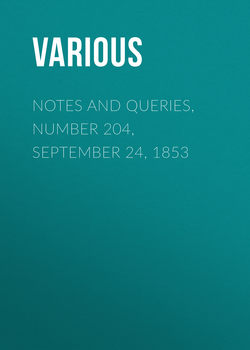Читать книгу Notes and Queries, Number 204, September 24, 1853 - Various - Страница 3
Notes
"GIVE HIM A ROLL."—A PLEA FOR THE HORSE
ОглавлениеWe learn, from the comedy of the The Clouds, that the Athenians were accustomed to refresh their horses after a race by allowing then to roll on the ground; for Pheidippides, the wild young man of the play, who spent much of his own time and of his father's money on the "turf," and who is shown in the opening scene fast asleep in bed, dreaming of his favourite amusement, says very quietly,
"Ἀπαγε τὸν ἵππον ἐξαλίσας οἴκαδε" [32]—
an order which he had probably often given to his groom at the Hippodrome, the Newmarket or Ascot of Athens.
I have often seen racing, I have often seen hunters brought home after a hard day's work, and I have read of forced marches, &c. made by cavalry and artillery; but never yet have I heard of an English Houyhnhnm, either at home or abroad, who was invited to refresh himself after his labours, civil or military, classically, with a roll.
Dobbin, that four-footed Ofellus,
"Rusticus, abnormis sapiens, crassâque Minervâ,"
whenever he has the luck to spend his summer Sunday's otium cum dignitate in a paddock, invariably indulges in a baker's dozen, without waiting for an invitation to do so, and without saying "with your leave" or "by your leave."
They ordered this matter better in Africa some fifty years ago, and I hope they still continue so to order it.
By one of the stipulations of the hollow Peace of Amiens, the colony of the Cape of Good Hope was restored by Great Britain to the Batavian Republic, which immediately appointed Mr. J. A. de Mist its Commissary-General, and despatched him to receive the ceded territory from the hands of the English, to instal the new Governor, General J. W. Janssens, into his high office, and to reorganise the constitution of the colony.
Having fulfilled these duties, Mr. De Mist determined to make a tour of inspection, and he accordingly travelled on horseback nearly 4500 English miles through the interior. Among his suite was a Dr. Lichtenstein, the physician and savant of the party, who afterwards published an account of the expedition.
The extract that I am about to make from his work may at first sight appear unnecessarily long; but I wish the "courteous reader" to bear in mind that I do not cite it for the sake of parading a long rambling comment on five short words of Aristophanes, but for that of bringing forward additional evidence, to prove that a dry roll may occasionally be of as much service in recruiting the strength and spirits of that noble animal, the horse, when jaded by violent exertion or long-protracted toil, as our English nostrums, a warm mash or a bottle of water. Dr. Lichtenstein says,—
"Our road led us soon again over the Vogel river and here we were obliged to supply ourselves with water for the whole day, since not a drop was to be met with again till the Melk river, a distance of ten hours [ = 50 English miles]. When we had filled our vessels, and our cattle had drunk plentifully, we proceeded on our way.
"It is difficult for an European to form an idea of the hardships that are to be encountered in a journey over such a dry plain at the hottest season of the year. All vegetation seems utterly destroyed; not a blade of grass, not a green leaf, is anywhere to be seen; and the soil, a stiff loam, reflects back the heat of the sun with redoubled force; a man may congratulate himself that, being on horseback, he is raised some feet above it. Nor is any rest from these fatigues to be thought of, since to stop where there is neither shade, water, or grass, would be only to increase the evil, rather than to diminish it.
"Yet the African horses are so well accustomed to hardships, although they have in fact much less innate strength than the European, that it is incredible what a length of way they will go, in the most intense heat, without either food or drink. It is, however, customary for the riders to dismount at intervals, when the saddles are taken off, and the animals are suffered to roll upon the ground and stretch out their limbs for a short time. This they do with evident delight, and after they have well rolled, stretched, and shaken themselves, they rise up and go on as much refreshed as if they had had food and drink given them. On arriving at a farm, the invitation of the host, who comes immediately to the door, is, 'Get off, Sir, and let him roll.' A slave then appears, takes the horse, and leads him backwards and forwards for a few minutes, to recover his breath, and he is then unsaddled and left to roll.
"These rollings were then the only refreshment we could offer our horses, and both they and their riders were, when towards evening they arrived at the Melk river, exceedingly exhausted."—Travels in Southern Africa in the Years 1803-1806. By Henry Lichtenstein, Doctor in Medicine and Philosophy, &c. &c. Translated from the original German by Anne Plumptre: London, Henry Colburn, 1812; vol. i. chap. xxv.
C. Forbes.
Temple.
